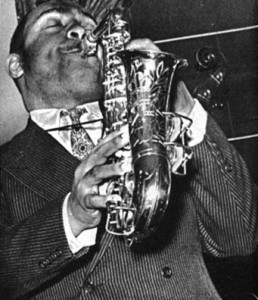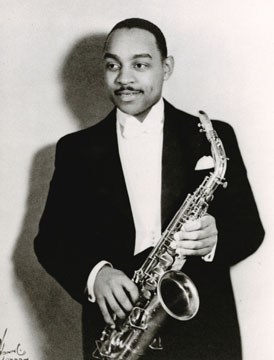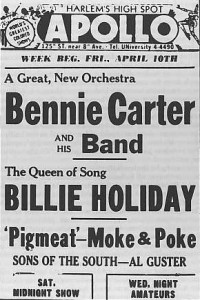
Benny Carter. Photo courtesy Rutgers University Institute of Jazz Studies.
Riverwalk Jazz recalls the nine decade career of saxophonist, trumpeter, composer and arranger Benny Carter with music and memories from the maestro himself; and an interview with Ed Berger, Associate Director of the Institute of Jazz Studies at Rutgers University. Berger was Carter's road manager and one of the authors of the definitive biography, Benny Carter: A Life in American Music.
BONUS PHOTO GALLERY
Musicians respectfully called Carter, “The King,” and considered it an honor to perform in his bands, even when there was little or no pay. Jazz artists knew they would be surrounded by the best players in Benny Carter's groups, and that his music would be challenging and exciting.

Benny Carter, 1936. Photo courtesy Rutgers Univ. Institute of Jazz Studies.
A pioneering jazzman whose career began in the 1920s Benny Carter played the saxophone, trumpet, clarinet and piano. He was an influential composer and arranger, and is widely considered an "Architect of the Swing Era sound." Benny Carter was one of the first African-Americans to write music for movies and television soundtracks, and became a role model for others in that field.
Benny Carter grew up in the tough Manhattan neighborhood of San Juan Hill. By age fifteen Carter was sitting-in at Harlem night spots. As a boy Carter wanted to play trumpet like his hero Bubber Miley, then switched to saxophone, thinking it would be the easier instrument to master. Carter would go on to master both trumpet and saxophone, and he played both instruments throughout is life.
By 1928 at the age of 20, Benny had mastered the craft of writing arrangements for jazz bands. He was hired by top band leader Fletcher Henderson and swiftly became the most influential jazz arranger in New York. He also made his first recording that year. By the 1930s he was performing and writing music in Europe and America for his own bands and those of Benny Goodman, Count Basie, Duke Ellington, Glenn Miller, Gene Krupa and Tommy Dorsey.

Ad for Benny Carter and His Band at the Apollo. Image courtesy Rutgers Univ. Institute of Jazz Studies.
Carter's first successful score for a Hollywood movie was Stormy Weather, in 1943. Thereafter, Benny spent much of his time scoring films and TV shows. He continued to write jazz arrangements and to perform brilliantly on alto saxophone and trumpet well into his 90s.
Featured this week are rare recordings of Benny Carter live with The Jim Cullum Jazz Band in a 1992 Riverwalk Jazz appearance on stage at The Landing. Carter performs music with Jim and the band that he created many decades earlier, including his famous standards, "When Lights are Low" and "Blues in My Heart." Carter also presents more recent compositions, like his "People Time."
Photo credit for Home Page: Jim Cullum, Ed Torres and Benny Carter. Photo courtesy Riverwalk Jazz.
Text based on Riverwalk Jazz script by Margaret Pick © 2012

